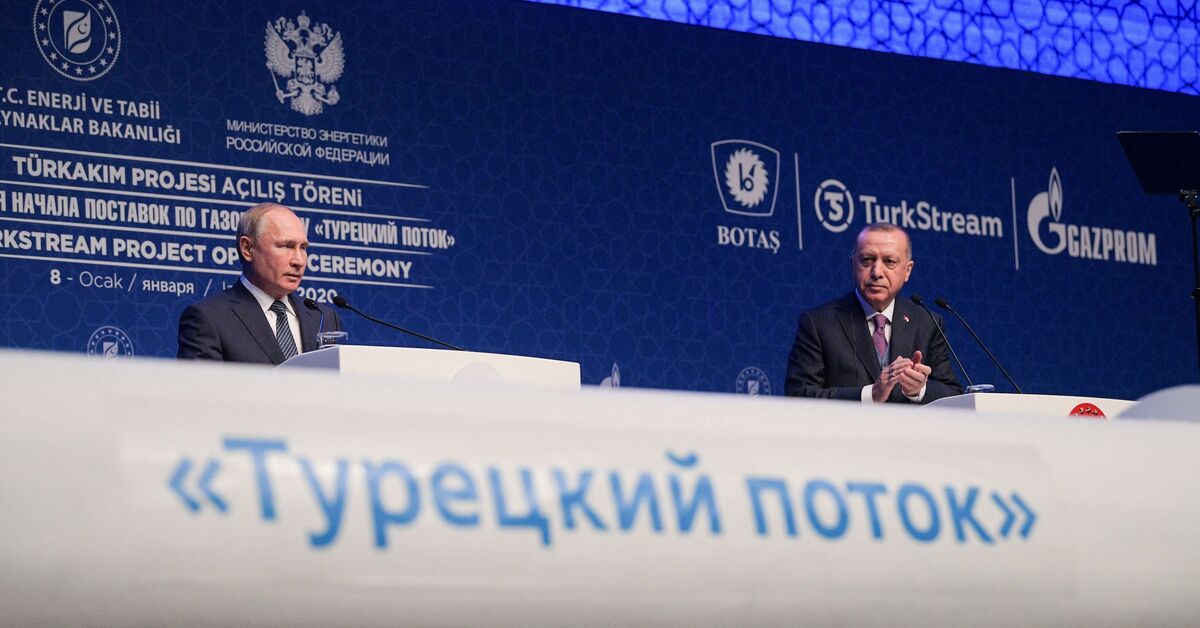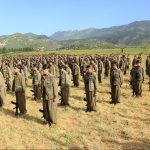Russian President Vladimir Putin’s offer to set up a “gas hub” in northern Turkey grabbed headlines following his meeting with Turkish President Recep Tayyip Erdogan, but the viability of the offer, which has been under discussion for over a decade, amounts to little more than window dressing.
Exports of Russian gas to Europe have dropped to a fraction of normal levels, and with Moscow warning, or more accurately threatening, further cuts, much of Europe is facing the likelihood of widespread gas and power cuts.
Turkey, however, is not only not facing such cuts, but it has also been praised by Putin for being Russia’s “most reliable partner” for Russian gas exports to Europe as a reward for which it has been offered the chance of hosting a gas hub.
The idea of Turkey as a hub for gas exports from regional gas producers has been under discussion for over a decade.
Back then, efforts to transit gas from countries like Azerbaijan, Iraq, Iran and Israel to Turkey for possible onward transit to Europe coincided with plans to open Turkey’s long mooted energy trading market — now operating as EPIAS.
Why the issue should suddenly come back on the agenda now is not difficult to understand.
Russia has cut or hugely reduced gas exports to countries that have imposed sanctions in response to its continuing invasion of Ukraine while signally continuing to supply those countries that haven’t — Hungary, Serbia and Turkey.
At the same time, Turkey is facing twin parliamentary and presidential elections next year at a time when high inflation, a weak Turkish lira and other issues have caused poll ratings for Erdogan and his ruling Justice and Development Party (AKP) to fall to a level where for the first time in some 20 years an opposition victory appears possible.
When Iran, which supplied just 16.1% of Turkey’s gas last year, cut exports without warning in January, the result was widespread gas and power cuts for the Turkish industrial sector and record low poll ratings for Erdogan.
Russia last year supplied 44.8% of Turkey’s gas, and any disagreement with Putin that led to gas cuts over winter would certainly impact next year’s elections.
Conversely, good relations with Moscow offer the promise of none of the gas shortages Europe is facing, and the offer of a hub suggests Turkey will be getting some control over the gas it transits to Europe and over gas prices.
“This hub proposal is designed to appeal to Turkish voters who think that having a hub will earn the country money and make it a more important player, which is not the case,” said Arif Akturk, a former head of the gas department at Turkey’s state-owned gas importer and transit pipeline operator Botas.
The question is: What exactly constitutes a hub?
On a physical level, a hub is a place where pipelines carrying gas from different sources and belonging to different companies converge, allowing the gas to be transited on to other places.
In that respect, Turkey already is, to a certain extent, a hub. Pipelines bring gas from Russia via the TurkStream pipeline and from Azerbaijan via the TANAP and South Caucasus pipelines, which is then transited to buyers in Europe via pipeline connections to Greece and Bulgaria.
On a commercial level, a hub is a point in a gas transit network where pipelines converge and diverge, creating a fixed point where gas can be traded — otherwise known as a Virtual Trading Point, of which Europe already has many.
However, not all gas is traded at hubs, which is the case with the Russian and Azeri gas that transits Turkey to customers who have already contracted to buy it with the companies producing the gas — a fact that makes Putin’s hub offer somewhat meaningless.
“They say they will transit gas to Turkey and sell it from here to European gas traders, but that’s exactly what they do already,” Akturk told Al-Monitor, pointing out that the existing TurkStream pipeline carries Russian gas through Thrace to Bulgaria and on to buyers in Southeast Europe without any commercial Turkish involvement required.
Even if Russia’s state gas producer and exporter Gazprom was to change its sales strategy to utilize a new hub in Turkey, there would still be a major obstacle.
“To be a hub requires surplus volumes, storage and a competitive local gas market,” explained David Tonge, director of Istanbul-based energy consultancy IBS, pointing out that with Ankara currently subsidizing domestic Turkish gas prices, there is no “competitive market” — a situation that may appeal to voters but rules out Turkey becoming a gas trading hub.
What hasn’t been so clearly spelled out in statements about the hub plans is the fact that Putin’s offer also envisages greatly increasing the volume of Russian gas to be transited through Turkey to Europe.
TurkStream currently consists of two lines, each of which can carry 15.75 billion cubic meters a year. One supplies gas to Turkey; the other to Europe.
In an interview on Oct. 14, Russia’s Deputy Prime Minister and former Energy Minister Aleksandr Novak pointed out that the original plan was for “four lines with a capacity of approximately 63 billion cubic meters,” suggesting that an expanded TurkStream could supply more European consumers via Turkey.
On paper that might be possible if European countries still trusted Russia sufficiently enough — in the wake of its invasion of Ukraine — to allow a new and expanded TurkStream to deliver gas and most importantly to end the current sanctions regime.
“Laying two more lines of TurkStream would require specialist steel pipe and pipe-laying equipment that sanctions will make difficult to obtain,” said Tonge.
Doubling the capacity of TurkStream would also take up to five years to complete and, if realized, create a potentially more serious problem.
“Increasing the volume of Russian gas reaching Southeast Europe makes it more difficult for Caspian gas producers to compete,” said Akturk.
Such a development would be unlikely to appeal to Turkey’s closest ally, Azerbaijan, which already exports gas to Europe via Turkey and plans to export more to European countries desperate to diversify from their dependency on Russian gas.
Source:Al-Monitor



